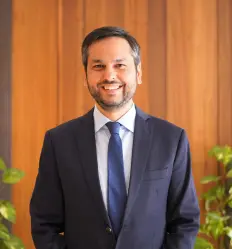

2:30 am IST - 4:00 am IST
Past Event
2:30 am - 4:00 am IST
No. 6, second floor, Dr Jose P Rizal Marg, Chanakyapuri
New Delhi
110021
Content from the Brookings Institution India Center is now archived. After seven years of an impactful partnership, as of September 11, 2020, Brookings India is now the Centre for Social and Economic Progress, an independent public policy institution based in India.
Ambassador Klynge presented the Danish TechPlomacy initiative and the discussion focused on how governments can best engage private companies and other key stakeholders in addressing challenges and opportunities arising from rapid technological change. The roundtable saw a frank exchange of Indian and European outlooks on data regulation and protection, highlighting the importance of new coalitions and partnerships of like-minded states to develop a deeper dialogue and stronger global governance.
Techplomacy as a bridge between governments and companies
Ambassador Klynge outlined the contours of the TechPlomacy initiative, Denmark’s attempt to address the short-term and long-term challenges that disruptive technologies pose in the 21st century. Klynge emphasised that governments were not alone in this, and that there is a need for further collaboration with the private sector. He explained that the initiative was born out of a need to institutionalise responses to the growing influence of technology companies around the world, which could provide the external pressure required to increase their responsibility.

Participants debated opportunities for India to develop its own TechPlomacy, and the need to engage Indian companies in these debates. Some noted that while the Indian government should take the initiative, Indian companies must also be more proactive and share their inputs, rather than waiting at the sidelines and merely reaping short-term benefits from technological change. The discussion also focused on the role of global tech superpowers and how the global tech industry is playing an increasingly influential role in shaping domestic and foreign policies of various states. As one participant noted, major tech companies are developing their own foreign policies and often operate without any regulation. While governments have historically always had to catch up and adjust to technological innovations, the current scale and pace poses an unprecedented challenge.
Balancing regulation, capital and privacy
The discussion also addressed the challenge of striking a balance between three divergences: governmental attempts to regulate versus economic growth, innovation and entrepreneurship imperatives; state control and territorial security imperatives versus individual rights and privacy; and the interests of data localisation versus global governance mechanisms. Participants weighed the benefits and downsides of each sides of these divides, and noted that in-between the American and Chinese models, the European and Indian approaches overlap significantly.

Participants also highlighted the need for moving beyond a traditional public and private sector conversation, and towards a more inclusive multi-stakeholder format, which includes members from civil society and the value that they bring. Given the complexity of technological change, how can new governance mechanisms be appropriately representative? Who will get to sit at the table, besides governments and companies? One participant emphasised the key role of legislative powers, and also of civil society groups that are pursuing data privacy as a human right, for example.
How playing defence creates divides
Participants noted that despite a few collective attempts to mitigate challenges of technology disruption, there was an increasing proliferation of separate regulatory frameworks, with each government or clusters of states developing their own approach. This was particularly apparent with the Internet, risking to fragment into many Internets, and the discussion focused on how this growing defensive nature of states will have negative consequence for everyone.

Further balkanisation and inability to collaborate will hinder economic growth and risks leaving everyone worse off. For example, one Indian participant noted that while the EU’s General Data Protection Regulation (GDPR) was welcome, in principle, it further complicated the prospects for deeper EU-India cooperation, whether on free trade or e-commerce. Similarly, it could also hinder intelligence sharing and cooperation to prepare against the threat of cyber-attacks. Discussants questioned whether this was leading to a greater divide, and possible solutions in this area. Given the transnational nature of technology and its potential role as a bridge rather than a divider, governments must focus on techplomacy as a collaborative and constructive approach.
Prospects for like-minded partnerships
The discussion ended on a more positive note, emphasising the growing need to move beyond the defensive, and towards a rules-based order where like-minded partners such as India and the European Union can play a positive role by crafting common approaches, regulations, and standards based on shared values. A common-value based approach, driven by India, Europe, the United States and other societies focused on the rule of law could raise the incentives for other state and non-state actors to buy in to a global system regulating several disruptive effects of technology, rather than staying at the margins.

Participants also highlighted areas of cooperation between India and Denmark, including the opening of a Danish Innovation Centre in India, as examples of how various technological domains can enhance bilateral relations. Despite being a small country, Denmark’s focus on techplomacy is allowing it to develop a more visible global role, leading important debates on technological innovation and change. Participants noted that India’s bilateral engagement with Denmark and several other governments on these key issues, including fintech or artificial intelligence, would pave the way for an emerging EU-India and various regional and global coalitions.
Moderator


Rosanne Haggerty, Ruby Bolaria Shifrin
March 2, 2026

Anthony F. Pipa, Adam Aley
March 2, 2026

Mark MacCarthy
February 26, 2026